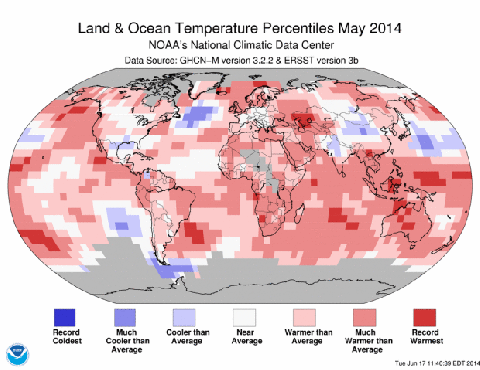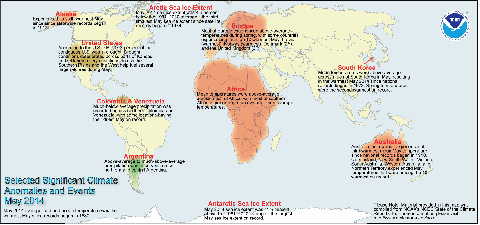Global Warming - it's a fact!
It's official, the National Climatic Data Center has confirmed that May 2014 was the warmest May ever recorded on planet Earth. What this means for winter in general is not discussed but you'll likely come to the same assumptions that I did. Have a read over the global highlights below, it's not pretty:
(Click for a larger view)

Global Highlights
- The combined average temperature over global land and ocean surfaces for May 2014 was record highest for this month, at 0.74°C (1.33°F) above the 20th century average of 14.8°C (58.6°F).
- The global land surface temperature was 1.13°C (2.03°F) above the 20th century average of 11.1°C (52.0°F), the fourth highest for May on record. For the ocean, the May global sea surface temperature was 0.59°C (1.06°F) above the 20th century average of 16.3°C (61.3°F), making it the record highest for May and tying with June 1998, October 2003, and July 2009 as the highest departure from average for any month on record.
- The combined global land and ocean average surface temperature for the March–May period was 0.74°C (1.33°F) above the 20th century average of 13.7°C (56.7°F), making it the second warmest such period on record, behind 2010.
- The March–May worldwide land surface temperature was 1.26°C (2.27°F) above the 20th century average, the third warmest such period on record. The global ocean surface temperature for the same period was 0.54°C (0.97°F) above the 20th century average, also the third warmest March–May on record.
- The combined global land and ocean average surface temperature for the January–May period (year-to-date) was 0.66°C (1.19°F) above the 20th century average of 13.1°C (55.5°F), the fifth warmest such period on record.

So what can we do? Here's a top 10 list from the David Suzuki Foundation. Time to get tree hugger:
1. Green your commute
Transportation causes about 25 per cent of Canada's greenhouse gas emissions, so walk, cycle or take transit whenever you can. You'll save money and get into better shape! If you can't go car-free, try carpooling or car sharing, and use the smallest, most fuel-efficient vehicle possible.
2. Be energy efficient
You already switch off lights — what's next? Change light bulbs to compact fluorescents or LEDs. Unplug computers, TVs and other electronics when not in use. Wash clothes in cold or warm (not hot) water. Dryers are energy hogs, so hang dry when you can. Install a programmable thermostat. Look for the Energy Star® label when buying new appliances. And a home energy audit is cheaper than you think — book one today to find even more ways to save energy.
3. Choose renewable power
Ask your utility to switch your account to clean, renewable power, such as from wind farms. If it doesn't offer this option yet, ask it to.
4. Eat wisely
Buy organic and locally grown foods. Avoid processed items. Grow some of your own food. And eat low on the food chain — at least one meat-free meal a day — since 18 per cent of greenhouse gas emissions come from meat and dairy production. Food writer Michael Pollan sums it up best: "Eat food. Not too much. Mostly plants."
5. Trim your waste
Garbage buried in landfills produces methane, a potent greenhouse gas. Keep stuff out of landfills by composting kitchen scraps and garden trimmings, and recycling paper, plastic, metal and glass. Let store managers and manufacturers know you want products with minimal or recyclable packaging.
6. Let polluters pay
Carbon taxes make polluting activities more expensive and green solutions more affordable, allowing energy-efficient businesses and households to save money. They are one of the most effective ways to reduce Canada's climate impact. If your province doesn't have a carbon tax, ask your premier and MLA to implement one.
7. Fly less
Air travel leaves behind a huge carbon footprint. Before you book your next airline ticket, consider greener options such as buses or trains, or try vacationing closer to home. You can also stay in touch with people by videoconferencing, which saves time as well as travel and accommodation costs.
8. Get informed
Follow the latest news about climate change. Join our community. Host a presentation for your community or workplace by requesting a presenter trained by Al Gore from The Climate Project Canada.
9. Get involved
Take a few minutes to contact your political representatives and the media to tell them you want immediate action on climate change. Remind them that reducing greenhouse gas emissions will also build healthier communities, spur economic innovation and create new jobs. And next time you're at the polls, vote for politicians who support effective climate policies.
10. Support and Donate
Many organizations, including the David Suzuki Foundation, are working hard on solutions to climate change and rely on financial support from citizens like you. Consider making a donation today by calling 1-800-453-1533 or by visiting our secure website.








